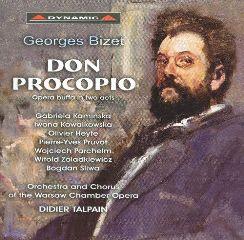Georges Bizet – Don Procopio (1998)
Georges Bizet – Don Procopio (1998)

1. Act I: Introduzione, concertato e coro: Gran piacer son gli sponsali (Chorus of Servants, Sopranos, Tenors, Chorus, Eufemia, Don Andronico, Pasquino) 00:08:45 2. Act I: Aria di Bettina: Voler che sposi un vecchio (Bettina) 00:02:58 3. Act I: Marcia: Qual suon! … (Don Andronico, Eufemia, Don Ernesto, Pasquino) 00:01:41 4. Act I: Trio: Che caro progetto (Bettina, Don Ernesto, Don Odoardo) 00:03:02 5. Act I: Cavatina di Ernesto: Non v'e, signor, di lei (Don Ernesto) 00:04:46 6. Act I: Finale: Concertato e coro: Davver credevo fare (Don Procopio, Chorus, Don Andronico, Don Ernesto, Bettina, Eufemia, Don Odoardo) 00:10:31 7. Act II: Serenata di Odoardo e duo: Sulle piùme dell'amore (Don Odoardo, Bettina) 00:05:26 8. Act II: Duo: Io di tutto mi contento (Bettina, Don Procopio) 00:09:50 9. Act II: Trio: Se lei di parola (Don Ernesto, Don Procopio, Don Andronico) 00:08:29 10. Act II: Duo: Per me beato appieno (Bettina, Don Odoardo) 00:04:03 11. Act II: Finale: Viva il conte! L'allegria (Chorus) 00:02:15 Witold Zoladkiewicz (Don Procopio) Gabriela Kaminska (Donna Bettina) Iwona Kowalkowska (Donna Eufemia) Olivier Heyte (Don Andronico) Pierre-Yves Pruvot (Don Ernesto) Wojciech Parchelm (Don Odoardo) Bogdan Sliwa (Pasquino) Orchestra and Chorus of the Warsaw Chamber Opera Didier Talpain (Conductor) Recorded live at the Lutosławski Studio of the Polish Radio, Warsaw, Nov. 1998.
This delightful, hour-long comic opera was finished by Bizet in 1859, but it wasn’t produced until 1906 (in Monte Carlo). Extra bits–recitatives, an additional aria, etc.–were inserted by someone else, which is somewhat understandable because there are no connective passages between numbers either in dialogue or recitative form. But for a recording, the musical numbers are enough, and they’re quite entertaining. Composed to an Italian libretto, this is unquestionably an Italian opera–fans of Rossini and Donizetti will be pleased. Even the plot–a young soprano girl in love with a tenor wheedles her way out of marrying an ugly, old, miserly basso suitor–is familiar from many Italian works of the half-century preceding this opera.
The work is filled with interesting ensembles (there are only two arias)–three duets, two trios, and two larger ensembles. If the plot of Don Pasquale comes to mind, well, it also does in the music itself. A charming tenor serenade is reminiscent of “Com’e gentil”, and a bit later a duo for soprano and tenor is undeniably like “Tornami a dir”. But I’m more inclined to think that the imitation is more generic than that; it’s just Bizet’s Italian–and more specifically, “bel canto”–opera. Other niceties abound: a lively soprano/bass duet, for instance, is chock-filled with coloratura for the soprano and patter for the bass.
This live performance (there is applause only following one duet, otherwise there’s no sign of the audience) is terrific. You might argue that the lead soprano, Gabriela Kaminska, has a somewhat hard edge to her voice, or that her tenor lover, Wojciech Parchelm, can sound a bit flimsy; but any weaknesses they have are far outweighed by their superb training and musicality, excellent ensemble work, and all-around excellence. The other singers sing and act their roles with true theatrical flair and right-on singing. Didier Talpain leads with endless verve and good humor and his Warsavian chorus and orchestra play and sing like champions. The sound is very good. This is more than a curiosity, and it is highly recommended. --- Robert Levine, classicstoday.com
Stylistically, this work is close to Donizetti and Rossini. The ensembles use the well-tested techniques in use since Cimarosa’s Il Matrimonio Segreto (1792); solo arias (there are only two in this work, which favours ensembles) strictly follow the canons of the day.
Particular attention was given by Bizet to the orchestration. Two harps, a guitar and a mandolin complete a classical orchestra (with 4 horns) which, on two occasions, is tinged with the nostalgic hue of English horns. Don Procopio is at the same time a tribute to and a re-visitation of Rossini, Donizetti and all other Italian composers of opera buffa of the 1810-40s. --- prestoclassical.co.uk
download (mp3 @320 kbs):
Last Updated (Sunday, 23 July 2017 17:05)








